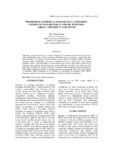| dc.contributor.author | Jamil, MD. Golam | |
| dc.date.accessioned | 2011-05-05T09:00:34Z | |
| dc.date.available | 2011-05-05T09:00:34Z | |
| dc.date.issued | 2010 | |
| dc.identifier.issn | 1811-3079 | |
| dc.identifier.uri | http://hdl.handle.net/10361/894 | |
| dc.description.abstract | Promoting ‘learner autonomy’ on a course of English for Academic Purposes (EAP) seems to be widely problematic as they, ‘learner autonomy’ and EAP course, are expected to supply both skills and knowledge to the learners to pursue studies of other subjects in English within a controlled academic setting. Additionally, the course is different in type as, unlike most of the regular academic courses, it has great impacts on the learning style to study other subjects. Based on the assumption that ensuring ‘learner autonomy’ would contribute to an EAP course effectively, this study tries to explore the key areas that to be considered while designing a learner-autonomous EAP syllabus. The paper compiles the findings through investigating the EAP course of the Master of Education (MEd) programme at the Institute of Educational Development (IED), BRAC University, and tries to put some recommendations together for further consideration. | en_US |
| dc.publisher | BRAC University | en_US |
| dc.relation.ispartofseries | BRAC University Journal, BRAC University;Vol. 7, No. 1 & 2, 2011, p. 45-52. | |
| dc.subject | EAP | en_US |
| dc.subject | Learner | en_US |
| dc.subject | Learning | en_US |
| dc.subject | Autonomy | en_US |
| dc.title | Promoting learner autonomy on a university course of English for academic purposes | en_US |
| dc.title.alternative | A BRAC University Case Study | en_US |
| dc.type | Article | en_US |

